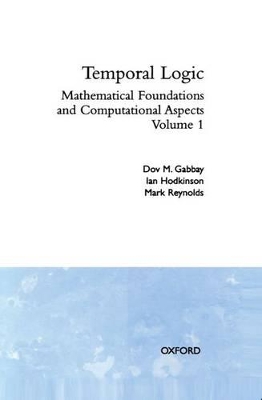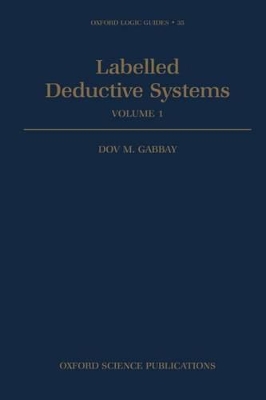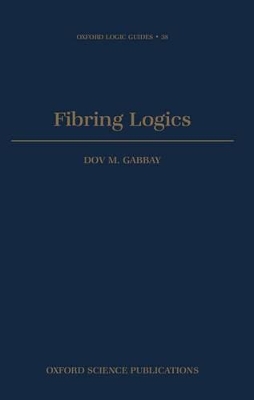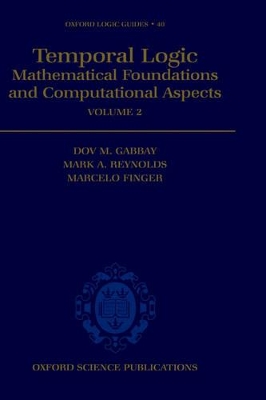Oxford Logic Guides
5 primary works
Book 28
This long awaited book gives a thorough account of the mathematical foundations of Temporal Logic, one of the most important areas of logic in computer science.
The book, which consists of fifteen chapters, moves on from giving a solid introduction in semantical and axiomatic approaches to temporal logic to covering the central topics of predicate temporal logic, meta-languages, general theories of axiomatization, many dimensional systems, propositional quantifiers, expressive power, Henkin dimension, temporalization of other logics, and decidability results.
Much of the research presented here is frontline in the new results and in the unifying methodology. This is an indispensable reference work for both the pure logician and the theoretical computer scientist.
The book, which consists of fifteen chapters, moves on from giving a solid introduction in semantical and axiomatic approaches to temporal logic to covering the central topics of predicate temporal logic, meta-languages, general theories of axiomatization, many dimensional systems, propositional quantifiers, expressive power, Henkin dimension, temporalization of other logics, and decidability results.
Much of the research presented here is frontline in the new results and in the unifying methodology. This is an indispensable reference work for both the pure logician and the theoretical computer scientist.
Book 33
This important book provides a new unifying methodology for logic. It replaces the traditional view of logic as manipulating sets of formulas by the notion of structured families of labelled formulas, the labels having algebraic structure. This simple device has far reaching consequences for the methodology of logics and their semantics. The book studies the main features of such systems as well as many applications.
The framework of Labelled Deductive Systems is of interest to a large variety of readers. At one extreme there is the pure mathematical logician who likes exact formal definitions and dry theorems, who probably specializes in one logic and methodology. At the other extreme there is the practical consumer of logic, who likes to absorb the intutions and use labelling as needed to advance the cause of applications.
The book begins with an intuitive presentation of LDS in the context of traditional current views of monotonic and nonmonotonic logics. It is less orientated towards the pure logician and more towards the practical consumer of logic.
The main part of the book presents the formal theory of LDS for the formal logician. The author has tried to avoid the style of definition-lemma-theorem and has put in some explanation.
The framework of Labelled Deductive Systems is of interest to a large variety of readers. At one extreme there is the pure mathematical logician who likes exact formal definitions and dry theorems, who probably specializes in one logic and methodology. At the other extreme there is the practical consumer of logic, who likes to absorb the intutions and use labelling as needed to advance the cause of applications.
The book begins with an intuitive presentation of LDS in the context of traditional current views of monotonic and nonmonotonic logics. It is less orientated towards the pure logician and more towards the practical consumer of logic.
The main part of the book presents the formal theory of LDS for the formal logician. The author has tried to avoid the style of definition-lemma-theorem and has put in some explanation.
Book 38
Modern applications of logic, in mathematics, theoretical computer science, and linguistics, require combined systems involving many different logics working together. In this book the author offers a basic methodology for combining-or fibring-systems. This means that many existing complex systems can be broken down into simpler components, hence making them much easier to manipulate. Using this methodology the book discusses ways of obtaining a wide variety of
multimodal, modal intuitionistic, modal substructural and fuzzy systems in a uniform way. It also covers self-fibred languages which allow formulae to apply to themselves. The book also studies sufficient conditions for transferring properties of the component logics into properties of the combined
system.
multimodal, modal intuitionistic, modal substructural and fuzzy systems in a uniform way. It also covers self-fibred languages which allow formulae to apply to themselves. The book also studies sufficient conditions for transferring properties of the component logics into properties of the combined
system.
Book 40
This is the second volume of this respected work in temporal logic. Whereas volume 1 dealt primarily with basic concepts and methods, volume 2 discusses the more applicable aspects of temporal logics. The first four chapters continue the more theoretical presentations in volume 1, covering automata, branching time and labelled deduction. The rest of the book discusses temporal databases, temporal execution and programming, actions and planning.
Book 46
This book is a specialized monograph on interpolation and definability, a notion central in pure logic and with significant meaning and applicability in all areas where logic is applied, especially computer science, artificial intelligence, logic programming, philosophy of science and natural language.
Suitable for researchers and graduate students in mathematics, computer science and philosophy, this is the latest in the prestigous world-renowned Oxford Logic Guides, which contains Michael Dummet's Elements of intuitionism (second edition), J. M. Dunn and G. Hardegree's Algebraic Methods in Philosophical Logic, H. Rott's Change, Choice and Inference: A Study of Belief Revision and Nonmonotonic
Reasoning, P. T. Johnstone's Sketches of an Elephant: A Topos Theory Compendium: Volumes 1 and 2, and David J. Pym and Eike Ritter's Reductive Logic and Proof Search: Proof theory, semantics and control.
Suitable for researchers and graduate students in mathematics, computer science and philosophy, this is the latest in the prestigous world-renowned Oxford Logic Guides, which contains Michael Dummet's Elements of intuitionism (second edition), J. M. Dunn and G. Hardegree's Algebraic Methods in Philosophical Logic, H. Rott's Change, Choice and Inference: A Study of Belief Revision and Nonmonotonic
Reasoning, P. T. Johnstone's Sketches of an Elephant: A Topos Theory Compendium: Volumes 1 and 2, and David J. Pym and Eike Ritter's Reductive Logic and Proof Search: Proof theory, semantics and control.




